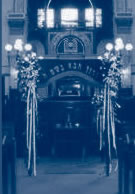|
SYNOPSIS: Sedra Noach Shabbat Rosh Chodesh:
Hertz Chumash p. 26 Genesis Chap. 6 verse 9
This week's Sedra is generously sponsored by George Huppert.
The Flood
Of his generation, Noah alone was righteous and walked with
G-d. Utter destruction now threatened all living creatures
and G-d revealed His design to Noah, commanding him to build
a three-storied Ark, 150 yards long, 25 yards wide and 15
yards in depth, so that he and his family would be saved from
the impending flood. When the Ark was completed, Noah, his
wife, his three sons Shem, Ham and Japheth, together with
their wives, entered it, taking with them seven pairs of every
clean species of animals and one pair of every unclean species.
After seven days heavy rain fell continuously for forty days
and nights and huge waves of water erupted from the earth.
All living things outside the Ark were drowned. Five months
elapsed before the waters began to subside and the Ark rested
on the mountains of Ararat. After many more months had passed,
Noah released a raven to ascertain whether land had reappeared
but it flew to and fro as it could find no resting place.
At seven day intervals, he sent out a dove which returned
on two successive occasions but not on the third and Noah
then knew that the ground was dry. He and his family then
left the Ark in which they had lived for one year and ten
days. Noah offered sacrifices and G-d made a covenant that
never again would He destroy the whole of mankind by flood.
The blessing previously bestowed on Adam was repeated meaning
that Noah and his sons would rear families, populate the earth
and have dominion over all creatures. They were given seven
commands, among them not to eat the blood of animals or take
human life. As a visible confirmation of the covenant a rainbow
appeared in the sky.
The Vineyard:
Noah began to cultivate the ground and planted a vineyard.
After drinking wine, he became intoxicated and lay unclothed
in his tent. His son Ham, amused at the incident, told his
brothers Shem and Japheth who respectfully covered their father
with a garment. Noah awoke and, realising what had happened,
condemned Ham for his disrespect and foretold that his descendants
would become a servile race, whereas the generations of Shem
and Japheth would be blessed.
Tower of Babel:
After the death of Noah, the earth became repopulated through
the descendants of Shem, Ham and Japheth who were the founders
of numerous nations. At one time, mankind had been congregated
in Babylonia speaking one language. Fearing that they might
be dispersed, they decided to build a city and high tower
reaching towards the sky as a focal point to ensure that they
dwelt together and could achieve their evil aims. G-d, therefore,
confused the language of the builders so that they ceased
work as they could not understand each other and He scattered
the people over the face of the earth. The place was called
Babel, that is, confusion.
From Shem to Abraham:
The tenth in regular descent from Shem was Abraham whose
father, Terah, lived in Ur of the Chaldees in Babylonia. Ur,
at that time, was the main centre of moon-goddess worship
by the Sumerians, who, though a highly-developed cultural
race, were steeped in idolatry. Terah decided to emigrate
to the land of Canaan and left with his son, Abraham, his
grandson Lot and Sarah, Abraham's wife. On their journey northwards
they arrived at the city of Haran in Mesopotamia where they
stayed for some time and where Terah died.
SPECIAL MAPHTIR - SHABBAT ROSH CHODESH HERTZ CHUMASH P.
695 Numbers Chap. 28 verses 9 - 15 inc.
HAPHTORAH - FOR SHABBAT ROSH CHODESH HERTZ CHUMASH P.
944 Isaiah Chapter 66
The final chapter of Isaiah comprises the reading when Shabbat
and Rosh Chodesh coincide owing to its reference in the penultimate
verse to the continued and ever more popular observance of
Rosh Chodesh in the future.
The chapter combines fierce admonition for those who pervert
sincere observance, mock the ways of G-d and worship idolatry
while it also describes the rebirth of Israel and the ingathering
of exiles.
The penultimate verse referring to Rosh Chodesh is repeated
again after the conclusion of the Haphtorah.
TELL ME RABBI ..... HALLEL: HYMNS OF PRAISE WHEN HALLEL
IS SAID :
Six psalms (113 -118), collectively known as Hallel (Hymns
of Praise), are said immediately following the Shacharit Amidah
on Pesach, Shavuot, Succot, Channukah and on Rosh Chodesh.
The beauty of these Psalms remains unsurpassed. Not wanting
to leave G-d's praises to chance, the Sages made these psalms
a mitzvah for the festivals. Some regard Hallel on these festivals
as a Torah obligation.
Hymns of praise to G-d are to be said whenever we celebrate
events that commemorate the deliverance of our people from
dire peril (Pesahim 117a) e.g. on Channukah, the ruling of
the Israeli Chief Rabbinate for saying Hallel on Yom Ha'atzmaut
and Yom Yerushalayim.
The joyous mood and tempo of Hallel make it most appropriate
for festivals and for days of national rejoicing. Its music
reflects high spirits and exuberance: "This is the day
which the Lord G-d made, we will be glad and rejoice therein"
(Psalm 118).
HOW HALLEL IS SAID:
Hallel is preceded by the recitation of a blessing. Maimonides
ruled that since Hallel on Rosh Chodesh is only a custom one
omits the blessing as one does not recite a blessing over
a custom (Hil. Hanukkah 3:7).
This is adhered to by Sephardim but Ashkenazim do recite a
blessing even on Rosh Chodesh. It became customary also to
conclude Hallel with a blessing ending with, "...Blessed
art Thou, Lord, a King extolled in psalms of praise."
We stand when reciting Hallel because it is a testimony to
G-d's wondrous deeds and powers, and because testimony in
Jewish courts is always given while standing. Also, it is
in keeping with the verses: "Give praise, ye servants
to the Lord; you who stand in the house of the Lord"
(Psalms 135: 1-2).
BACK TO SHABBAT SHALOM
TABLE
|








